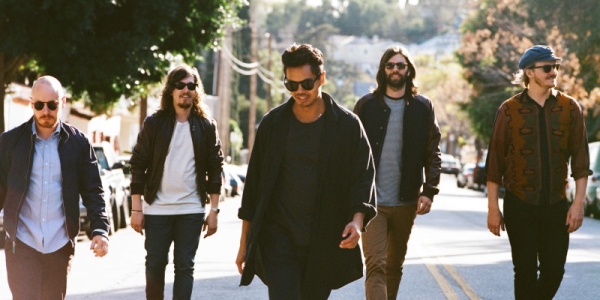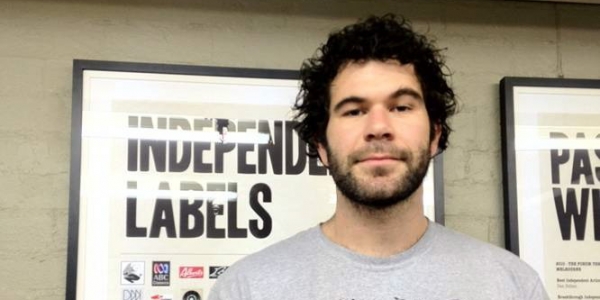Mandagi is talking to me post-soundcheck, backstage before a show in Houston. The relentless touring schedule of one of Australia’s biggest musical exports is indicative of their global clout since the success of their debut Conditions – and especially the unprecedented popularity of Sweet Disposition. The Temper Trap now tour worldwide almost full-time, have recently played to over 99,000 people at the MCG during the AFL grand final, and are coming back to Australia to play stadium shows with Coldplay – not bad for a couple of General Pants Co. colleagues who decided to start a band five years ago.
But this success hasn’t come without a very business-savvy mindset from the band; for Mandagi, the music is paramount, but a marketing plan for your band is just as important. “You have to be smart in manoeuvring your career, so I don’t mind if people are discovering us through ads and stuff,” he says. “None of us [in the band] have an issue about it. It was necessary to do at the time, and it’s gotten us to where we are now. There are still a lot of people that are very idealistic about music and art … and how whenever it’s coupled with corporations and money, it all of a sudden loses its artistic value or artistic merit. We don’t see it that way. We see it as an avenue for that song to be heard by countless people.”
The single Sweet Disposition off their 2009 debut had immense coverage through popular culture for a long time after its release, most notably in the indie film favourite (500) Days of Summer, and in a heavily distributed Diet Coke ad campaign. It’s also been featured in 90210, Ted, Skins, Secret Diary Of A Call Girl and Eat Pray Love, and in commercials for Sky Sports, Chrysler, Peugot, O2, and Toyota. But for Mandagi, it’s not how people hear the music that counts; it’s the fact that they’re hearing it. “It’s the way forward. Radio is no longer the main avenue where people will discover or hear music,” he says. “We’ve got a little bit of bad rap in the past for doing it, but it was the difference between coming to America for the first time and playing to nobody, and coming to America for the first time and selling out all the gigs – because they’d heard us on (500) Days of Summer or heard Sweet Disposition on a Coke ad.”
After playing shows and festivals almost nonstop off the back of Conditions, Mandagi and the rest of the band took some time away from each other before re-grouping in Hackney, London to write their sophomore. To completely embrace journalistic clichés, their self-titled second album is noticeably darker – and for Mandagi, that came from not just his time in London, but from some more personal issues that he hadn’t really had the time to deal with. “[Writing the second album] was pretty much like putting myself through therapy. When I sat down to write lyrics, I found myself revisiting old places in my mind that I thought I’d shut out… I was discovering that I still had things I needed to get off my chest.”
The band were all located in Hackney for the writing and recording of The Temper Trap, but Mandagi chose to live alone this time. The environment you’re living in inevitably shapes the tone of what you’re writing, and it was this combination of London living and an almost self-inflicted loneliness that paved the way for the mood on The Temper Trap’s second album.
As well as their Coldplay dates this month, The Temper Trap are on the bill for Future Music Festival in March next year, where they join the likes of The Stone Roses, PSY, Dizzee Rascal and Azealia Banks. A Future Music billing is testament to the band’s mass appeal, and I ask Mandagi how it is that people who get off to PSY and Steve Aoki can also love The Temper Trap. “I believe that’s what you call ‘crossover’ – a bit of industry lingo for you there,” he laughs. “But that’s how it works, and we’re not afraid of that. We’re not afraid to be accessible to all sorts of people, whether you’re an accountant in an office or whether you drink latte in a café for a living, whatever. We’re not trying to make exclusive, pompous, snobby music. We just want to make music that we like and hopefully that other people like, regardless of what you do or who you are. For what it’s worth, I like PSY. I think he’s awesome – and I can do a pretty good Gangnam style.”
BY RACH SENEVIRATNE







